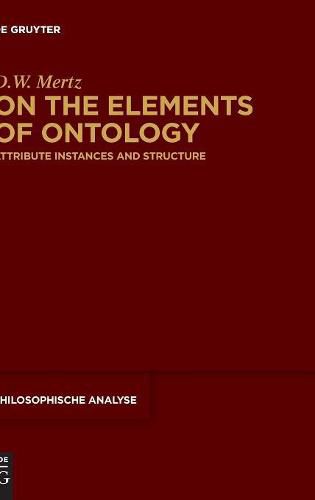Readings Newsletter
Become a Readings Member to make your shopping experience even easier.
Sign in or sign up for free!
You’re not far away from qualifying for FREE standard shipping within Australia
You’ve qualified for FREE standard shipping within Australia
The cart is loading…






This title is printed to order. This book may have been self-published. If so, we cannot guarantee the quality of the content. In the main most books will have gone through the editing process however some may not. We therefore suggest that you be aware of this before ordering this book. If in doubt check either the author or publisher’s details as we are unable to accept any returns unless they are faulty. Please contact us if you have any questions.
Central to Elements is an assay of the attributional union properties and relations have with their subjects, a topic historically left metaphorical. The work critiques eight Aristotelian assumptions concerning attribute dependence and ‘inherence’, per se subjects (‘substances’), attributes as agent-organizers, and unity-by-a-shared-one. Groups of these assumptions are seen to yield contradiction, vicious regress, or other problems. This analysis, joined with insights from an assay of ubiquitous structure, motivate ten theses explicating attribution and its primary ontic status. The theses detail: attributes proper as individuated instances, structure as instance-generated facts and their two forms of composition, the conditioning role and universal nature of instances’ component intensions, the primacy of attribute instances for generating all forms of composition and complex entities, and identity and indiscernibility criteria for the latter. Principal is the insight that attribution is intension-determined combinatorial agency. It is its systematizing implications that provide solutions to classic problems, e.g., Composition, Individuation, and Universals, and in net generate a comprehensive one-category structuralist ontology.
$9.00 standard shipping within Australia
FREE standard shipping within Australia for orders over $100.00
Express & International shipping calculated at checkout
This title is printed to order. This book may have been self-published. If so, we cannot guarantee the quality of the content. In the main most books will have gone through the editing process however some may not. We therefore suggest that you be aware of this before ordering this book. If in doubt check either the author or publisher’s details as we are unable to accept any returns unless they are faulty. Please contact us if you have any questions.
Central to Elements is an assay of the attributional union properties and relations have with their subjects, a topic historically left metaphorical. The work critiques eight Aristotelian assumptions concerning attribute dependence and ‘inherence’, per se subjects (‘substances’), attributes as agent-organizers, and unity-by-a-shared-one. Groups of these assumptions are seen to yield contradiction, vicious regress, or other problems. This analysis, joined with insights from an assay of ubiquitous structure, motivate ten theses explicating attribution and its primary ontic status. The theses detail: attributes proper as individuated instances, structure as instance-generated facts and their two forms of composition, the conditioning role and universal nature of instances’ component intensions, the primacy of attribute instances for generating all forms of composition and complex entities, and identity and indiscernibility criteria for the latter. Principal is the insight that attribution is intension-determined combinatorial agency. It is its systematizing implications that provide solutions to classic problems, e.g., Composition, Individuation, and Universals, and in net generate a comprehensive one-category structuralist ontology.